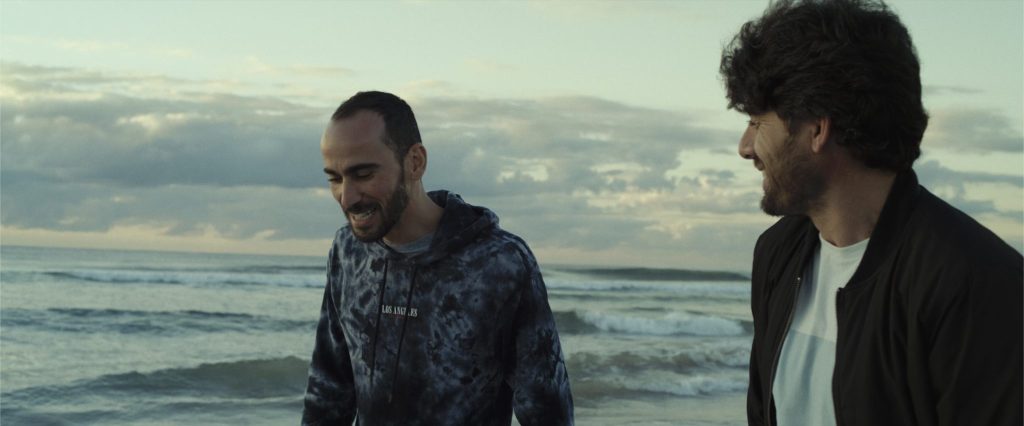A new documentary follows the journey of two extraordinary Kurdish refugees, Farhad Bandesh and Mostafa (Moz) Azimitabar, who fled persecution in Iran and arrived in Australia seeking asylum in 2013. Good Samaritan Sister Sarah Puls reviewed Freedom Is Beautiful, an uplifting story of the power of love and our shared humanity.
For many viewers, particularly those who have been concerned about the distressing treatment of people who come to Australia seeking safety, the main protagonists of this film will be familiar faces.
Mostafa (Moz) Azimitabar and Farhad Bandesh are Kurdish refugees who are now living in the community in Australia after being imprisoned for years in immigration detention, first on Manus Island and later in Australia.
Freedom Is Beautiful is a powerful exploration of these two men; of the torture they endured, of their efforts to maintain their integrity and life and, ultimately, their survival and determination.
The documentary skilfully utilises archival footage to give insight into the childhood experience witnessing and fleeing from the genocide of the Kurdish people during and after the Iran-Iraq War. The moving melodies and snippets of poetry allow the viewer to glimpse the profound importance of Moz and Farhad’s Kurdish identity as they explore how their own artistic energies have been core to their survival.
Like a poetic narrator, the soundscape and music hold the viewer gently through diverse but connected aspects of Moz and Farhad’s lives, a reflection of their experience of the soundtrack of their lives. Moz explains how even in the war, witnessing the murder of women and children, the sounds of screaming would fall silent, allowing the wind in the trees like ‘a kind of music’ to be his companion and comfort.
As the images move to refugees on small fishing boats the movie powerfully contrasts familiar footage of John Howard, Kevin Rudd, Tony Abbott and Peter Dutton in news conferences and propaganda videos with media exposing deaths in detention, the attacks on those held on Manus Island, the horrors of life in offshore detention, each with their own soundtrack of crying and violence and silence.

Image: Howling Eagle Productions.
Interviews with Moz and Farhad are powerful glimpses into how they have survived and have tried to come to terms of with loss of the “seven and half years” and “over 2700 days” during which they were imprisoned.
Knowing that others didn’t survive, that along with those who were killed are those whose hope has been lost and those who continue to be held in detention, Moz speaks of his decision to “try to be kind to myself” and Farhad of his belief that there is “something inside” which must be found. They speak of wanting not to escape but to resist the cruelty, and that art and music were part of that resistance, and key to survival.
Contemporary video of the men singing contrasts with archival footage of the same men singing the same song while detained on Manus Island. The historical images showing gaunt and imprisoned men resisting the soullessness through songs, explaining that music and art have no borders, that the feel of the music is conveyed without knowing the meaning of the words. The feel of resistance is constant in both the archival and the contemporary, but in the contemporary there seems to be joy and strength which is shared with those who share in the singing.

Image: Howling Eagle Productions.
As the movie progresses there is more footage of the present day. The sight and sound of Moz and Farhad living life in Australia, connected with each other and powerfully connected with the communities around them. The men have identities and lives much bigger than their experience of cruelty at the hands of the Australian system, they are artists, musician, a wine maker, a speaker, a philanthropist, a friend.
The joy of those relationships, the importance of knowing that they are seen and valued, is background to the hope of this movie.
There is much still to be solved. It was only this month that the last refugee held on Nauru was evacuated. The Australian Government recently renewed the agreement which designates Nauru as a Regional Processing Centre for a further 10 years. There are still 80 refugees and asylum seekers being held in Papua New Guinea, most in Port Moresby.
There are some 19,000 people who are now able to move from Temporary Protection Visas to permanent residency but who continue to be denied access to timely family reunion.
There are about 12,000 people whose applications for protection were refused or not considered under the broken ‘fast-track’ system and who continue to have no clarity around pathways to safety.
To watch the trailer, click here
Freedom Is Beautiful featured in the Sydney Film Festival during Refugee Week (June 18-24). The documentary is supported by Amnesty International and was produced and directed by Angus McDonald, and executive produced by human rights activist Craig Foster.
